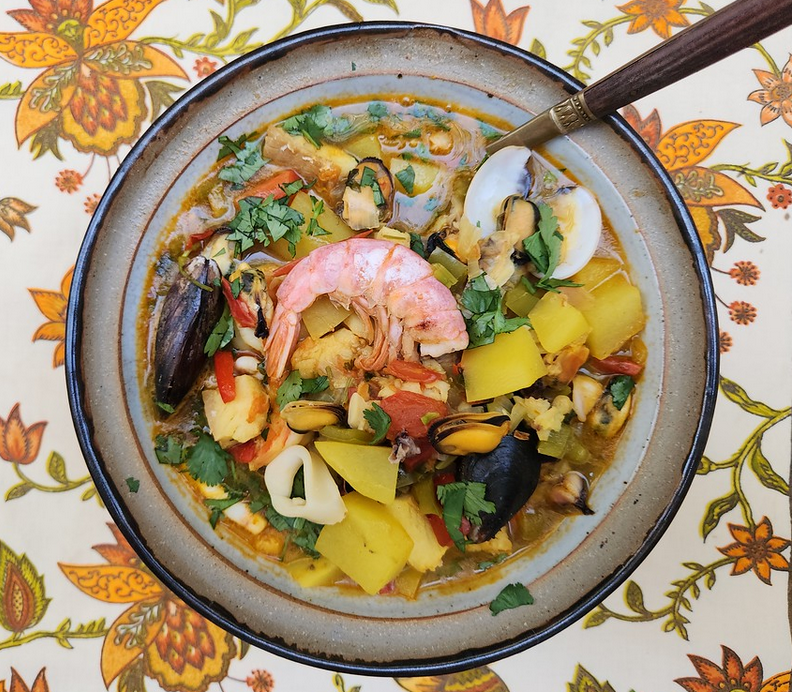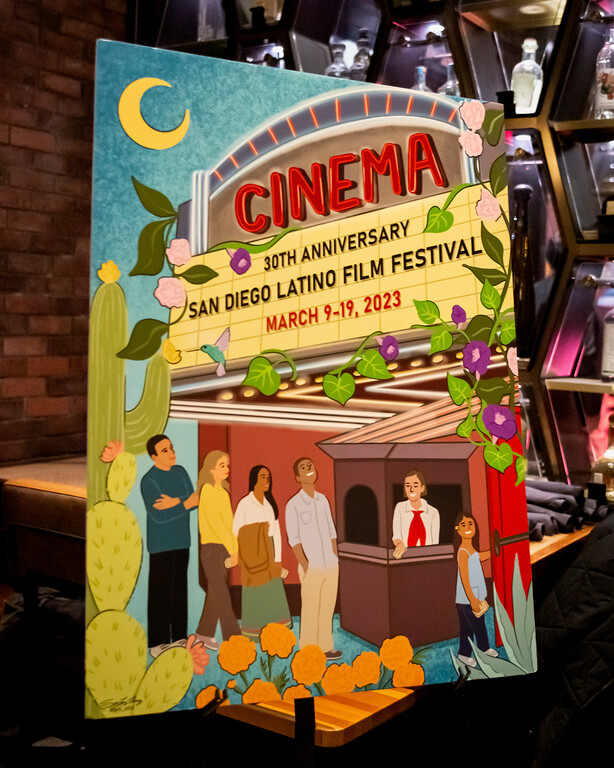 |
This year marks the 30th anniversary of the San Diego Latino Festival. Understandably the pandemic impacted the festival, but we are excited to report that it has returned in full vigor with live film screenings and a number of exciting special events for 2023. This year's festival will feature over 150 feature-length films and shorts that represent a wide variety of Latino experience, both here and in Latin America. There will be opening and closing night parties (with live music), a festival-long art exhibition (Arte Latino Gallery & Mercado), an awards ceremony, a festival “village” of community partners and sponsors, and the return of the Sabor Latino Food, Beer & Tequila Fest (March 11) and more. Every year, the festival producers, the San Diego Media Arts Center, host a Media Kickoff party to introduce the festival and to provide an opportunity to talk with local filmmakers whose films have been selected for this year’s festival. |
The first filmmaker we spoke with was Ahuatl Amaro who wrote and produced the comedy short Warehouse which will be shown on Sunday, March 12th. The film is part of the ¡Somos! Cine LGBTQ+ showcase for this year's festival. His film is about a queer Latino-indigenous warehouse worker who must choose between keeping his job or standing up to his boss when his LBGTQ coworkers are fired for demanding better working conditions at the warehouse where they work. Ahuatl said he grew up in LA in a working-class family, and he want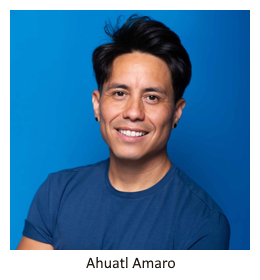 ed to make a film that not only reflected that experience but also resonated with his own queerness and experiences working in a warehouse. He introduced himself by saying “I’m queer, I’m brown and I’m here”. He said that San Diego has a special place in his heart because of his experience here organizing for Walmart workers, adding he also has worked statewide in campaigns for worker’s rights. He turned to filmmaking which he says has a broad impact on people. He noted that he was motivated by the lack of significant Latino and LBGTQ roles in mainstream film and TV noting that less than five percent of Hollywood roles are filled with Latino actors, adding rarely do you see an actor that is “short, brown and queer like me”. He says he wanted to make a film that blended comedy with a sense of social activism, and this resulted in him coming up with the idea for his film. He said he came up with the idea for the film because of the recent efforts of workers at Walmart, Amazon, and Starbucks, and he thought to himself, “let’s have some fun with this”. The film’s main characters are all some mix of transgender, queer, bisexual, Latin, or Black.
ed to make a film that not only reflected that experience but also resonated with his own queerness and experiences working in a warehouse. He introduced himself by saying “I’m queer, I’m brown and I’m here”. He said that San Diego has a special place in his heart because of his experience here organizing for Walmart workers, adding he also has worked statewide in campaigns for worker’s rights. He turned to filmmaking which he says has a broad impact on people. He noted that he was motivated by the lack of significant Latino and LBGTQ roles in mainstream film and TV noting that less than five percent of Hollywood roles are filled with Latino actors, adding rarely do you see an actor that is “short, brown and queer like me”. He says he wanted to make a film that blended comedy with a sense of social activism, and this resulted in him coming up with the idea for his film. He said he came up with the idea for the film because of the recent efforts of workers at Walmart, Amazon, and Starbucks, and he thought to himself, “let’s have some fun with this”. The film’s main characters are all some mix of transgender, queer, bisexual, Latin, or Black.
Nicole Valencia’s film Like Honey is her first film in the SDLFF, and she says she is excited to have it chosen for this year’s festival. Like Honey is part of the Frontera Filmmakers Showcase and will be screened on March 13th. The film is about a somewhat aimless young woman who visits a beachside commune in 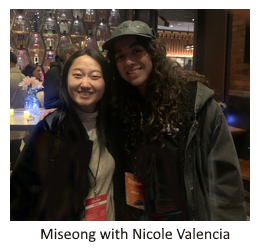 Tijuana and “gets caught up in a whirlwind of psychedelic drugs and healing practices” only to come to realize that this might not be the paradise she thought it would be. The film took 6 to 8 months to produce, was made on a tiny budget, and as a result of the small budget, she not only wrote and directed the film, but she shot most of it and edited the film. We spoke about how much easier this has become with digital media. Valencia said that she has a passion for film but, as she didn’t attend a film school, much of what she knows is self-taught. She says that she believes that right now is a particularly fertile time for Latin filmmaking, and she says that artists and filmmakers like herself are experiencing more opportunities and support than ever before.
Tijuana and “gets caught up in a whirlwind of psychedelic drugs and healing practices” only to come to realize that this might not be the paradise she thought it would be. The film took 6 to 8 months to produce, was made on a tiny budget, and as a result of the small budget, she not only wrote and directed the film, but she shot most of it and edited the film. We spoke about how much easier this has become with digital media. Valencia said that she has a passion for film but, as she didn’t attend a film school, much of what she knows is self-taught. She says that she believes that right now is a particularly fertile time for Latin filmmaking, and she says that artists and filmmakers like herself are experiencing more opportunities and support than ever before.
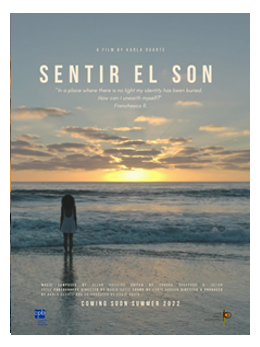 We also got a chance to talk with Latino Film Festival veteran (this year is the 3rd time one of her films was selected), Karla Duarte. Her short documentary, Sentir el Son (in English “Feel the Sound”) is being shown in the Ritmo Latino Showcase on March 10th. Embracing the diversity of Latino experience, her film is about an Afro-Mexican dancer named Franshesca who grew up in LA immersed in Mexican culture. Her experience led her to question her ethnic identity after she came into a greater appreciation of the dual nature of her heritage. Carla says that the film a poetic work that explores the somatic feeling and meaning of Franshesca’s developing awareness of her ethnic and gender identity mediated through music, song, and dance.
We also got a chance to talk with Latino Film Festival veteran (this year is the 3rd time one of her films was selected), Karla Duarte. Her short documentary, Sentir el Son (in English “Feel the Sound”) is being shown in the Ritmo Latino Showcase on March 10th. Embracing the diversity of Latino experience, her film is about an Afro-Mexican dancer named Franshesca who grew up in LA immersed in Mexican culture. Her experience led her to question her ethnic identity after she came into a greater appreciation of the dual nature of her heritage. Carla says that the film a poetic work that explores the somatic feeling and meaning of Franshesca’s developing awareness of her ethnic and gender identity mediated through music, song, and dance.
As noted above, the festival features several thematic showcases, including Mexico Today, Spotlight Films, Hay Que Reirse, Frontera Filmmakers, ¡Somos! Cine LGMTQ+ Un Mundo Extrano, Documania, Ritmo Latino, and several films featuring the acclaimed Mexican actor Juaquin Cosio.
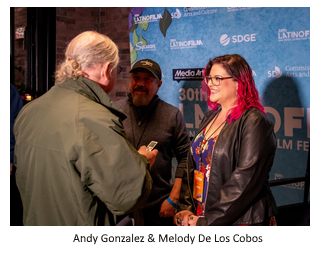 This year’s festival also includes a festival-long art exhibition. It was also good to catch up with Andy Gonzalez, a local leader in the Latino visual arts scene. Andy and Melody De Los Cobos are curating the Art Latino Gallery & Mercado, which features the works of numerous Latino artists as well as interactive live-art demonstrations in the Arte Latino Gallery space and elsewhere in the Mission Valley Mall.
This year’s festival also includes a festival-long art exhibition. It was also good to catch up with Andy Gonzalez, a local leader in the Latino visual arts scene. Andy and Melody De Los Cobos are curating the Art Latino Gallery & Mercado, which features the works of numerous Latino artists as well as interactive live-art demonstrations in the Arte Latino Gallery space and elsewhere in the Mission Valley Mall.
These are just a few of the filmmakers and artists attending this year’s Latino Film Festival Kickoff party and only represent a small slice of the incredible talent that is on display in this year’s festival. The impression we always get in interviewing such artists is that they are more motivated to tell unique and interesting stories than they are to create “box-office hits,” which is the all-too-common goal, indeed the fundamental goal of mainstream Hollywood films. Many of the films we see in this film are not aimed at creating flashy spectacles but represent a more artistic take on filmmaking which may lead to a broader understanding of what it means to be Latino and the huge expanse of what constitutes Latino experience. Stay tuned for updates!








